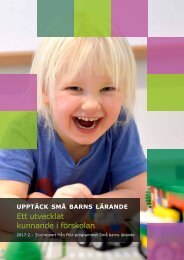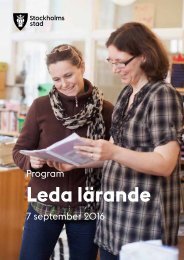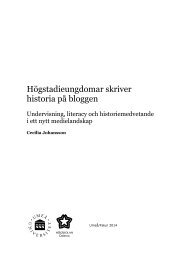FULLTEXT02
FULLTEXT02
FULLTEXT02
Create successful ePaper yourself
Turn your PDF publications into a flip-book with our unique Google optimized e-Paper software.
English Summary<br />
This thesis studies how pedagogical supervisors develop their mentoring<br />
skills over time. The empirical data is taken from group sessions aiming<br />
to enable preschool teachers to reflect and develop educational activities.<br />
The aim of the thesis is to investigate how a number of pedagogical supervisors<br />
developed their supervisory competence over a five-year period.<br />
In order to meet this objective two studies were made in which the<br />
following issues were important:<br />
a) what sort of learning takes place among the supervisors<br />
b) in what ways have different frameworks and conditions been important<br />
for guiding the talks<br />
c) can the patterns of conversation be discerned during the sessions and<br />
how do these patterns reflect their learning and skills<br />
The thesis presents two studies of educational supervisors and tutor based<br />
earning which were carried out with an interval of about ten years. The<br />
first study was made with twenty newly trained supervisors and a second<br />
follow-up study about five years later was conducted with ten of the<br />
same supervisors. This chapter summarizes the key findings from the<br />
two studies. I will start with the results from study 1.<br />
Study 1<br />
The analysis of the empirical material of study 1 demonstrates that the<br />
frames often have a significant impact on the ability to lead group tutorial<br />
conversations. Various frameworks provide opportunities as well as limits<br />
for the session. The impact on the process and the patterns of conversation<br />
that develop depends largely on how supervisors and group participants<br />
deal with the conditions given in the form of the contextual conditions<br />
that the management expects, the facilities, the size of the groups,<br />
the work situation and experiences. The spatial conditions are of importance,<br />
not least as regards access to premises or site, if you can sit and<br />
converse privately without being interrupted by phone calls, children,<br />
colleagues or others. That the time frame has great influence is obvious:<br />
132





